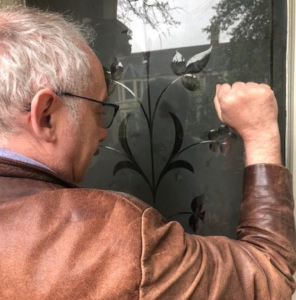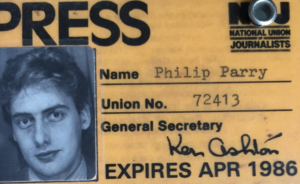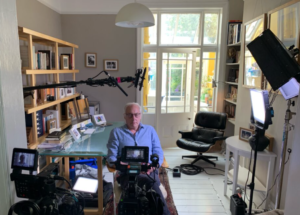- Disabling protests - 30th June 2025
- A good storybook - 30th June 2025
- Cancel culture part three - 27th June 2025

During 23 years with the BBC, and 40 years in journalism, our Editor Welshman Phil Parry always had to learn new terms, and this is now put centre stage by the rise today of Artificial Intelligence (AI) which is throwing up ever more.
Earlier Phil has described how he was helped to break into the South Wales Echo office car when he was a cub reporter, recalled his early career as a journalist, the importance of experience in the job, and making clear that the‘calls’ to emergency services as well as court cases are central to any media operation.

He has also explored how poorly paid most journalism is when trainee reporters had to live in squalid flats, the vital role of expenses, and about one of his most important stories on the now-scrapped 53 year-old BBC Wales TV Current Affairs series, Week In Week Out (WIWO), which won an award even after it was axed, long after his career really took off.
Phil has explained too how crucial it is actually to speak to people, the virtue of speed as well as accuracy, why knowledge of history and teaching the subject is vital, how certain material was removed from TV Current Affairs programmes when secret cameras had to be used, and some of those he has interviewed.

He has disclosed as well why investigative journalism is needed now more than ever although others have different opinions, how the coronavirus (Covid-19) lockdown played havoc with media schedules, and the importance of the hugely lower average age of some political leaders compared with when he started reporting.

It never ends.
You think you have learnt all you will ever need to know in relation to journalism, as well as organisations you may have to write about – but then along comes MORE.
The real lesson then is: LEARNING NEVER STOPS!
For example in newspapers there were phrases like ‘reverse ferret’ which meant praising somebody or something you had just castigated, or ‘door-stepping’ which meant forcefully securing an interview (likely to be brief) with somebody who had done something wrong.
 You may not even get words from the person in question.
You may not even get words from the person in question.
When I was working in London on the Today newspaper, I drove with the photographer all the way to Somerset to ‘door-step’ someone, but as soon as he opened the front door and saw us, the man slammed it in our faces, so we had to drive all the way back again!


All we got was a snatch-picture (another phrase which had to be learnt!), and the ‘story’ about it (such as it was) duly appeared in the paper.
In broadcasting there was a host of new phrases to learn, including “pumping” which meant feeding your tape with pictures and interviews into a special machine under a big mast or dish, so they could then be recorded back at headquarters.
Today, though, the huge growth in Artificial Intelligence (AI) is producing even more of them which journalists like me need to get across.

They may not even be directly to do with journalism, but as they are used by institutions you can be sure they will need to be learnt.
For example there’s, ‘There’s An AI For That’ which itself comes from the term ‘There’s An APP For That’.
It is in fact a website which has over 12,000 applications, up from fewer than 1,000 in 2022.

There’s also the company ‘DeepScribe’ which helps transcribe doctors’ notes.
Or we have ‘Harvey AI’ which assists lawyers, and thirty-two chatbots that promise “sarcastic conversation”, along with 20 generating tattoo designs.
All of these will have to be learnt by budding reporters as they do stories about people or firms using AI (which is soon likely to be many of them).

They will then know better than most, that LEARNING NEVER STOPS!
The memories of Phil’s decades-long award-winning career in journalism (including the terms he had to learn) as he was gripped by the rare disabling condition Hereditary Spastic Paraplegia (HSP), have been released in a major book ‘A GOOD STORY’. Order it now!

Regrettably publication of another book, however, was refused, because it was to have included names.
Tomorrow – why revelations that the Post Office (PO) spent more than £90 million fighting wrongly-accused sub-postmasters despite allegedly knowing its defence was untrue, again shines the spotlight on the enormous Welsh dimension to the scandal.










